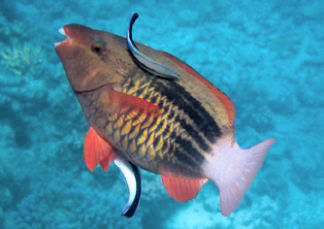Fishy Cleaners
Coral reef fish eavesdrop on their cleaners to see who does a better job.
By Emily Sohn
Coral reef fish don’t take showers. Instead, they swim over to tiny “cleaner” fish, which nibble off their crusty skin deposits. Everyone wins. The little fish get a meal, and their visitors get rid of bothersome parasites.
The relationship, however, is not so simple. The fish that do the cleaning actually prefer to dig a little deeper, taking a little nip of the tasty goo covering the skin instead of just skimming off the parasites. New studies now show that coral reef fish pay attention to how the cleaners do their job, preferring to visit those cleaner fish that are less likely to bite.
 |
|
As small cleaner fish feed on skin parasites of a bigger fish, they may be building their reputations as good workers. |
| I. Burkhardt |
Previous studies had found that, in the wild, cleaner fish seem to react to being watched by taking good care of their customers and biting them less often.
The idea that animals show off their good behavior and earn rewards from those who see it “has been floating around,” says behavioral ecologist Lee Alan Dugatkin of the University of Louisville in Kentucky. “This is the strongest evidence so far that it’s really happening in nature.”
In one set of tests, researchers used an aquarium with separate sections. In the middle section, they placed a type of coral reef fish called a bridled monocle bream. In the section at each end of the tank, the researchers placed a cleaner fish.
Then, the researchers presented each cleaner fish with a visitor fish to clean. One cleaner got a visitor that was already clean. The other got a visitor that was smeared with delicious prawns.
The monocle bream in the middle could see the cleaner fish, but the cleaners couldn’t see the monocle bream. As expected, the first cleaner mostly ignored its already-clean visitor. The second, on the other hand, munched and munched.
In 28 trials, the researchers found, the monocle bream in the center section tended to hover near the cleaner fish that was hard at work—almost as if it were waiting its turn with that cleaner.
In another study, the scientists wanted to see what would happen when the cleaners had an audience. They stocked two plates with both ho-hum fish-food flakes and delectable prawns. As long as the cleaner nibbled the flakes, the researchers left the second plate nearby—as if it were a waiting customer. If the cleaner fish gulped a prawn, though, the researchers snatched away the second plate.
The fish ate more of the uninspiring flakes when the second plate was nearby than when there was only one plate.
This mimics the situation in the real world, the researchers say. On a reef, a cleaner fish that takes a juicy bite out of a visitor’s skin could cause an upset that would drive away a waiting customer.—E. Sohn
Going Deeper:
Milius, Susan. 2006. Fishy reputations: Undersea watchers choose helpers that do good jobs. Science News 169(June 24):388. Available at http://www.sciencenews.org/articles/20060624/fob3.asp .
You can learn more about cleaner fish at www.amonline.net.au/fishes/fishfacts/fish/ldimidiatus.htm (Australian Museum) or www.soc.soton.ac.uk/GDD/hydro/atmu/ecology/chapter6/3.html (National Oceanography Centre, Southampton).







